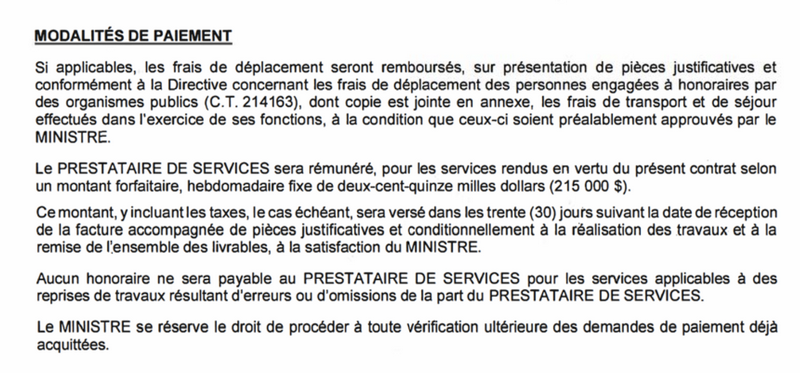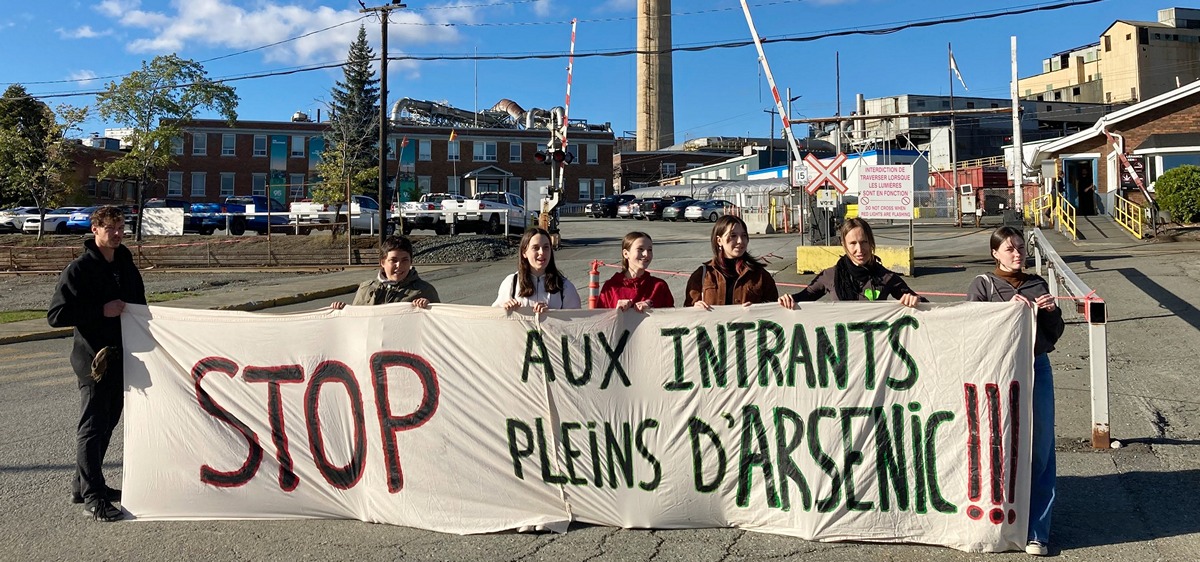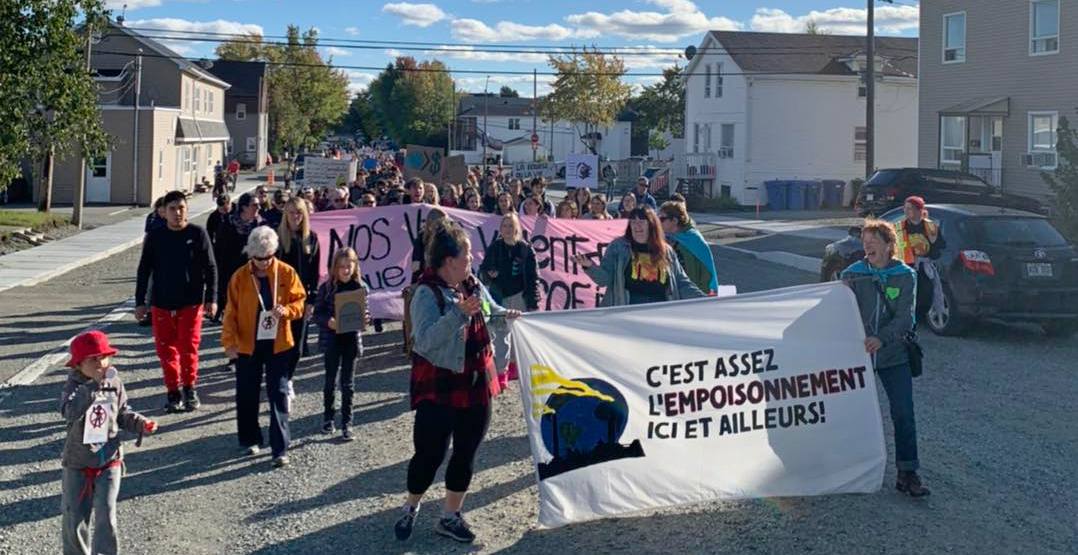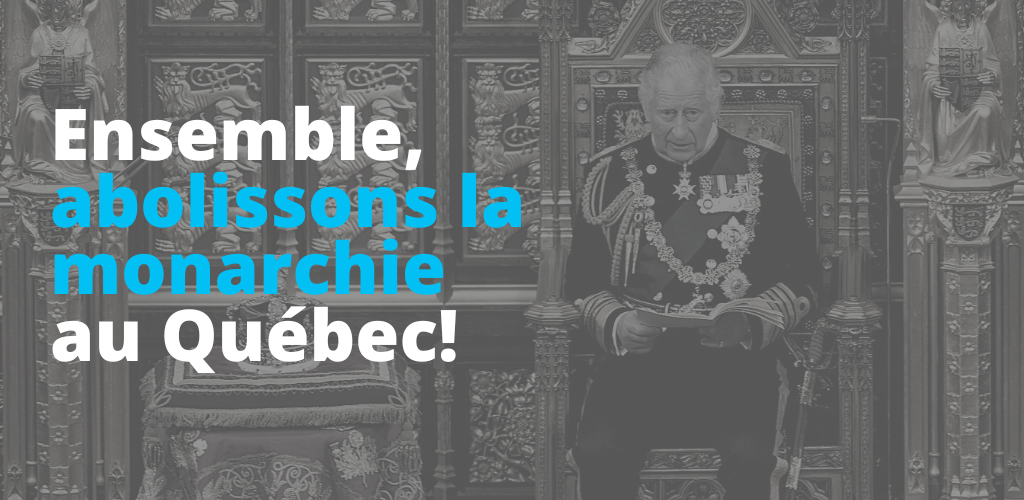October 2, 2022 - No. 23
October 3 Quebec Election
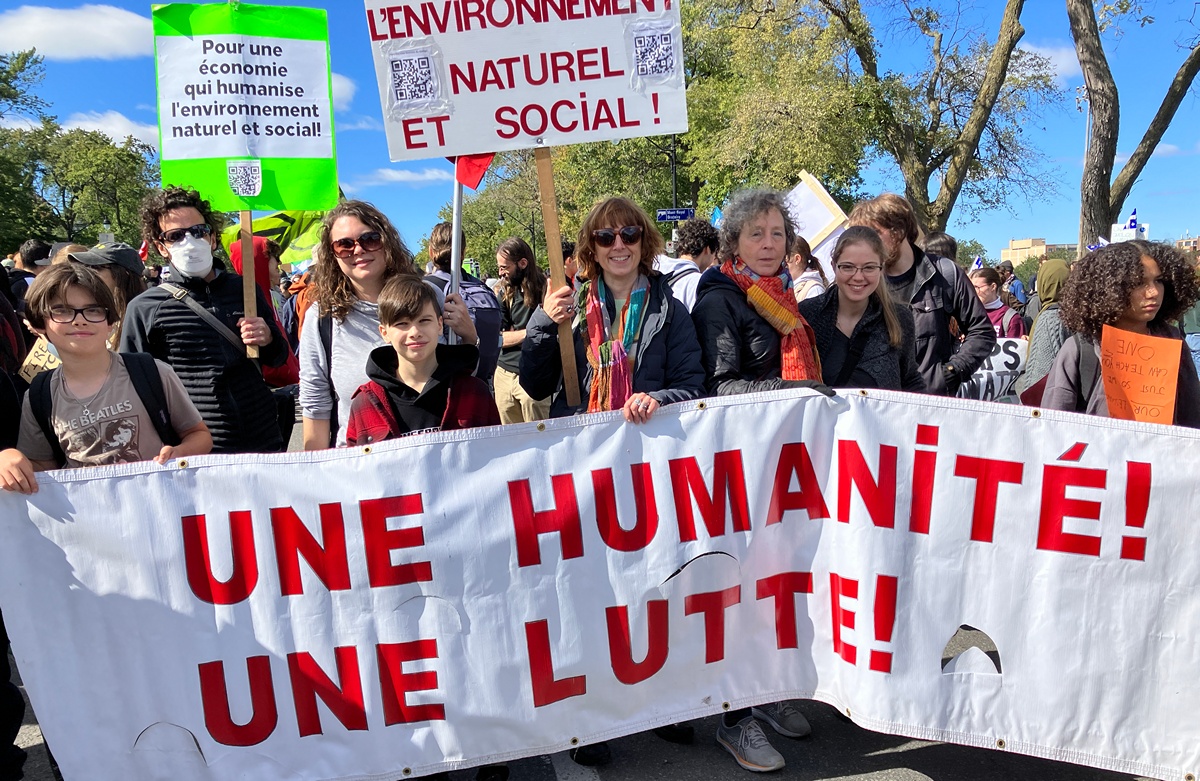
Climate strike action, Montreal, September 23, 2022
• Aim of a Legault Government's Promotion of Racism in the Name of Quebec Nationalism
• The Extremes of a Power Serving the Rich -- the Other Façade of Legault Nationalism
• The Use of Nationalism to Promote the Stereotype
of a Divided People
• What It Means to Be Civilized in Quebec
Discussion on How to Get Rid of the Monarchy and
Renew the Constitutional Order
• The Queen's Death and Democratic Renewal
• The Right to Be Who We Are, Not Who We Are Told to Be
• Will Members of Quebec's National Assembly Swear Allegiance to the King?
• The Significance of Not Swearing Allegiance to the King
• Petition for Abolition of Monarchy in Quebec
October 3 Quebec Election
All Out to Humanize the Social and Natural Environment by Promoting Social and Internationalist Solidarity as a Quebec Value!
The Youth for Democratic Renewal (YDR) rejects with contempt the so-called nationalism that Coalition Avenir Québec leader François Legault and his party will surely promote in a second Legault government. The YDR supports the call of the Marxist-Leninist Party of Quebec (PMLQ) to all Quebeckers, and especially to workers in the big cities, suburbs and regions, and to youth across Quebec, to take a strong, clear stand in favour of social and internationalist solidarity as a Quebec value, and to say loud and clear that Legault's nationalism is racist, reactionary and anti-worker, and that it does not speak for Quebeckers, including the so-called ethnic Quebeckers it claims to represent.
Let's be clear: the promotion of this nationalism in the name of Quebec values has as its sole aim to divide us in order to better impose the anti-social offensive that affects all Quebeckers without exception. This is certainly what a second Legault government will do. François Legault intends to use the next four years in power consolidating a government of police powers to impose policies that pay the rich and integrate our resources, infrastructure and labour force into the war machine and military production of the United States. To do this, it must impose an anti-worker, racist, war dictate that blocks workers' opposition, silences the voices of all those who have something to say and marginalizes them so that their struggles for their demands are not effective.
The state's promotion of racism is hateful. Legault claims that this is Quebec nationalism, that it is in line with the interests and values of the majority, as if the values of the majority were contrary to the values of all those who are not "old stock," as if those who are not "old stock" must conform or they have no place in Quebec. This disinformation in the name of nationalism serves to render passive those who are marginalized or not represented by any of the cartel parties or unions and social organizations. Divisions on the basis of language spoken, national origin, beliefs and conscience through the promotion of so-called nationalist or liberal or other values must be rejected. They are rejected in practice when workers fight for their rights and the rights of all, and this will certainly continue.
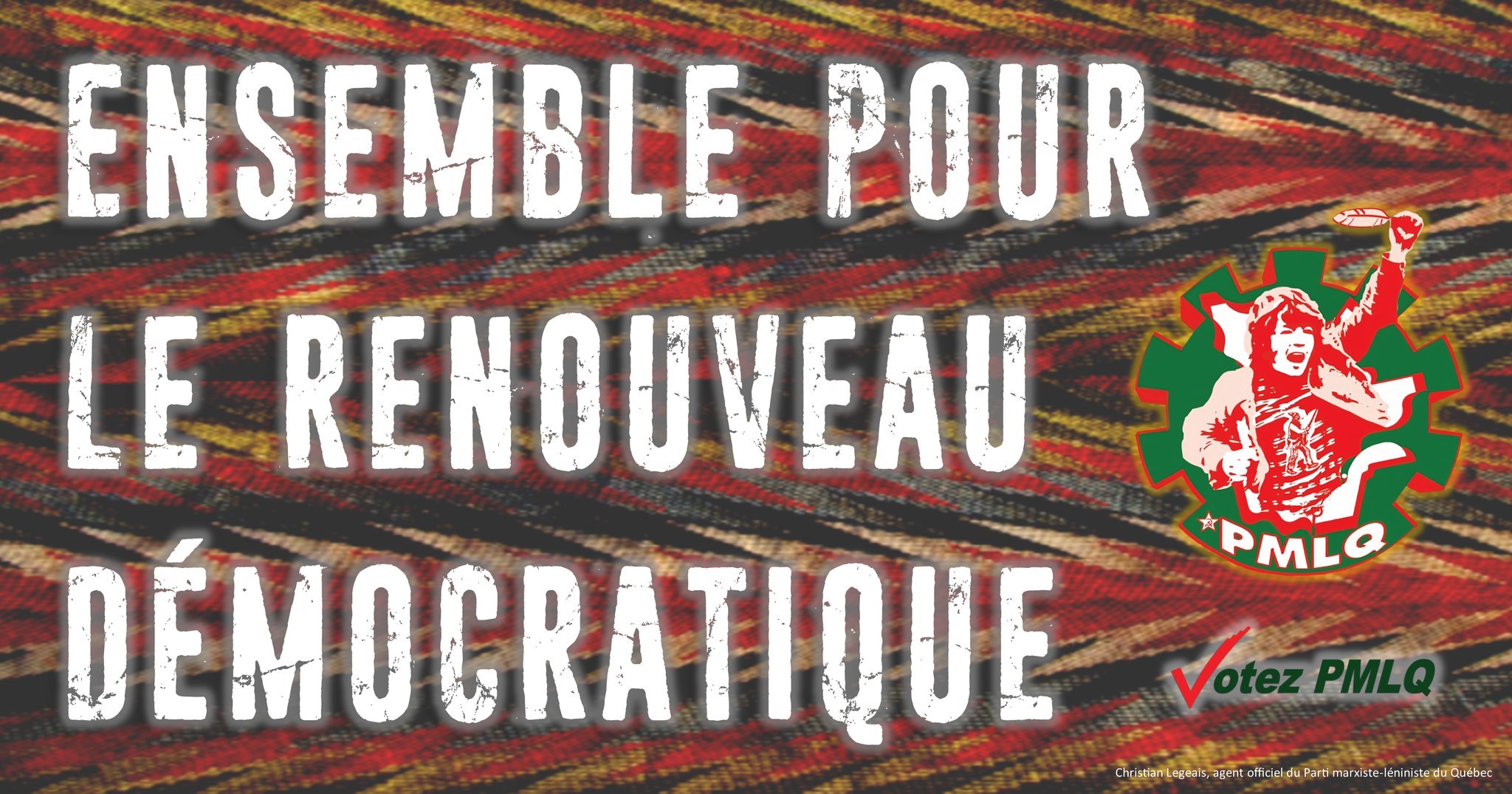 Youth for Democratic Renewal supports the PMLQ's call for everyone
to say loud and clear that they oppose any conciliation with cynical
strategies and manoeuvres, whether by Legault or the cartel parties
that refuse to defend clear-cut, enlightened positions based on modern,
internationalist
conceptions that consider that we have rights simply because we are
human beings with needs, desires, aspirations and struggles that we
hold in common. Each person's and each collective's conditions are
specific but we are one humanity struggling to humanize the social and
natural environment.
Youth for Democratic Renewal supports the PMLQ's call for everyone
to say loud and clear that they oppose any conciliation with cynical
strategies and manoeuvres, whether by Legault or the cartel parties
that refuse to defend clear-cut, enlightened positions based on modern,
internationalist
conceptions that consider that we have rights simply because we are
human beings with needs, desires, aspirations and struggles that we
hold in common. Each person's and each collective's conditions are
specific but we are one humanity struggling to humanize the social and
natural environment.
The specific task facing the working class, women, youth, Indigenous peoples, seniors and all Quebeckers is to not allow ourselves to be marginalized. We must create public opinion and find methods and opportunities to uphold our rights and the rights of all and to defeat state-organized and state-promoted attempts to divide us. There is no situation or circumstance where this kind of disinformation and conciliation with it can be considered acceptable, no matter what its origin or justification.
Workers, youth, women and all Quebeckers will be dealing with a government that uses executive powers outside the government of laws. The method used is to impose an anti-social dictate by using its majority to pass laws that give it the green light to govern by ministerial orders, notwithstanding clauses and other forms of rule by decree to marginalize and even criminalize the voice of the people and block the resolution of problems. All this will be done in the name of a racist nationalism that Legault and his party say is the nationalism of the majority of Quebeckers.
One Humanity, One Struggle!
All Out to Humanize the Social and Natural
Environment by Promoting Social
and Internationalist Solidarity as a
Quebec Value!
Aim of a Legault Government's Promotion of Racism in the Name of Quebec Nationalism
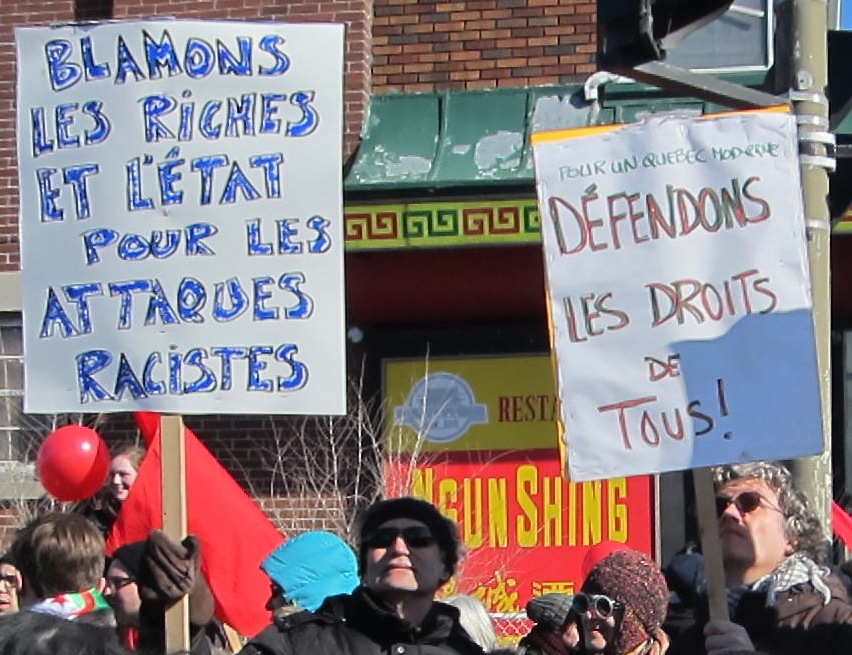
This system is based on the Covenant Thesis instituted in England after the civil war of the 1660s, and then adapted in France by Jean-Jacques Rousseau, who mastered it and helped shape the regime established by the republic that emerged from the French Revolution. This conception is in total crisis today.
The two variants of the supposed contract between the people and the governing elites are part of a system that is no longer capable of harmonizing the relationship between society and the individual because it places elites above the rest. It is a constitutional order that has become corrupted, that favours a privileged group and allows them to monopolize the wealth the workers produce by applying work to nature and to submit completely to the war plans of foreign powers. It is not for nothing that England, which gave birth to this system of government, is in total crisis today. It is not for nothing that France and all the countries of Europe whose nation-states are modelled on this theory of the British constitutional order are also plunged into an irreparable crisis.
François Legault, having succeeded in lowering the level of political discourse, simply wants to prove himself a champion of private interests. The method used is to make it appear that there is a conflict between his so-called nationalist discourse and the equally racist discourse of the self-styled anti-racist Liberals. They are two sides of the same coin. They all promote divisions among the people on the basis of language, values, origin, etc.
The truth is that these discourses preside and will preside over laws that attack the living and working conditions of all Quebecers for the benefit of the rich and that criminalize opposition using any pretext.
Vigilance is required to defend our rights and the rights of all!
The Extremes of
a Power Serving the Rich --
the Other Façade of Legault Nationalism
According to a Radio-Canada investigation, the McKinsey company played a central role in the entire period of the pandemic.
In May 2020, the Legault government rejected a request from the opposition parties to make public the transmission of all opinions and documents produced by the firm.[1] The confidential documents obtained show that the private consultants contributed to crucial decisions during the pandemic by providing advice to the Legault government, including on the communications strategy. They developed scenarios for purchasing protective equipment and worked on the PCR testing strategy. They also proposed solutions to remedy the shortage of staff in CHSLDs.
McKinsey's advice was billed to Quebec at $215,000 per week, plus taxes, or $35,000 per day, for the period from April to June 2020. In December, the bill was $247,196, still $35,000 per day. In total, the government officially paid $1.7 million for McKinsey to help prepare its plan to end the lockdown period, and $4.9 million to support it in the economic recovery plan.
Click on images above to enlarge
The consultancy steered committees, organized strategic meetings, distributed roles in working groups and had access to confidential information.
The consulting firm worked closely with the government on the health care human resources file. On May 26, 2020, McKinsey sent a document for discussion entitled "Levers for Addressing Human Resource Issues in CHSLDs." The objective was to find solutions to remedy the staff shortage.
Radio-Canada counted the presence of 10 different McKinsey consultants who worked closely with senior Quebec officials in 2020.
During the pandemic, McKinsey's clients included governments in the United States, France, Germany, the United Kingdom, Mexico, Ontario, and companies in all sectors of the economy, including pharmaceuticals, and international organizations.
Like other consulting firms, McKinsey works simultaneously for several public and private clients whose interests may conflict. The firm itself acknowledges this in its agreement with Quebec. On occasion, McKinsey has, at the same time, represented both a drug supplier and the public authority that authorizes the drug, as revealed by the New York Times.[2] The same thing happened in Quebec. Radio-Canada found several working papers produced by McKinsey that bore the logo of the Quebec government and the words "Your government."
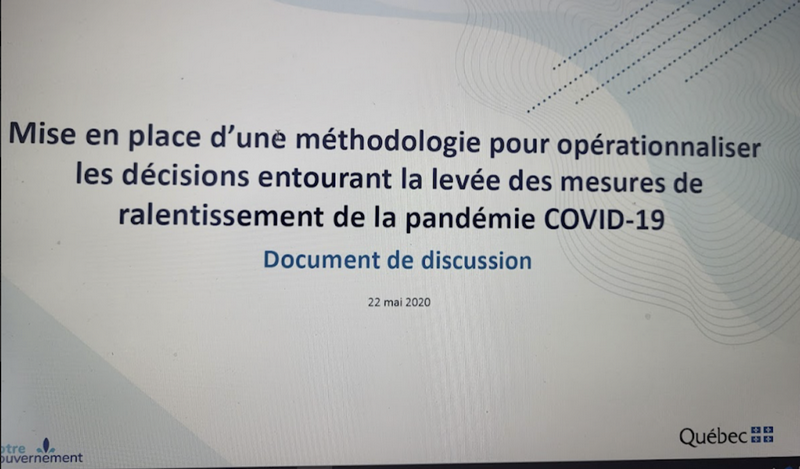
The investigation shows that between April and June 2020, McKinsey also collaborated with other ministries and agencies, such as the Ministry of Labour, Employment and Social Solidarity, the Ministry of Public Security, the CNESST and the Quebec Secretariat for Canadian Relations. The emails consulted do not show direct links to the Ministry of Education. However, McKinsey writes in a working paper that it has highlighted issues related to the reopening of CPEs (early childhood education centres) and primary schools (e.g. safeguards and student-teacher ratios).
While Quebec signed a $1.7 million contract with McKinsey on April 2, 2020, Ontario signed a contract with the same firm for $1.6 million the next day.[3]
On July 20, 2020, when the firm's mandate had been completed for
nearly two months, McKinsey attempted to approach an executive in
François Legault's ministry. "Is the management structure of
COVID-19 evolving to your liking?" asked the consulting firm's
representative in the email, and,
"Don't hesitate if we can help with anything." He informs that many
jurisdictions in North America are currently thinking about modernizing
the state and preparing for future pandemics. The Legault government
called on the firm's services again four months later, and again a year
later.
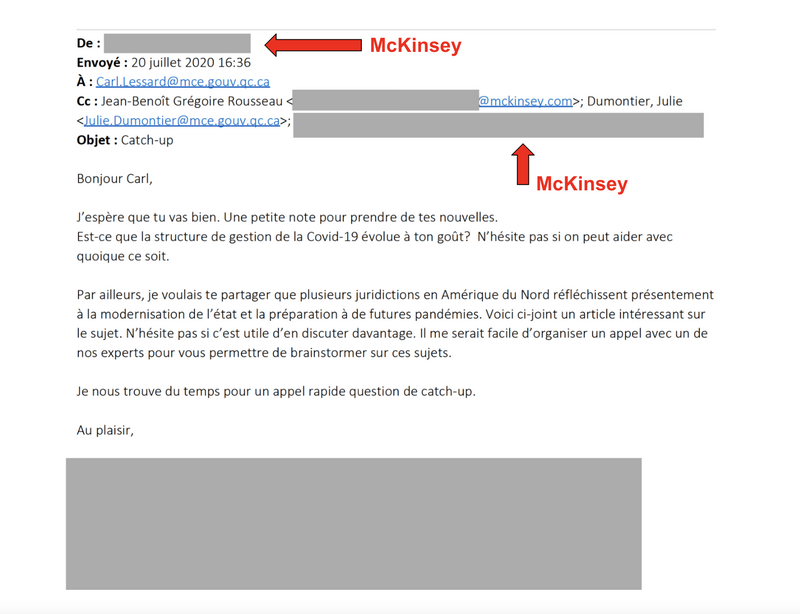
McKinsey is a notorious firm. In a September 29 New York Times article about a book entitled When McKinsey Comes to Town -- The Hidden Influence of the World's Most Powerful Consulting Firm, it is stated that McKinsey has immense influence in its pursuit of profits at the expense of moral principles. It is reported that the firm has, among other things, worked with U.S. immigration authorities responsible for the family separation policy at the Southern border. Many of McKinsey's recommendations are based on laying off workers and other forms of cutbacks, such as cutting spending on food, medical care and monitoring detainees at the border. The picture this book paints is one of a profit-hungry company spreading the good news of restructuring and relocation, without any guiding moral principle or code. In the 1990s, the firm promoted layoffs and the relocation of jobs abroad. In 2005, McKinsey advised Walmart, which was paying its employees such low wages that many of them were on welfare. A McKinsey-led task force recommended that in order to increase profitability, Walmart should increase the number of part-time employees and keep wages and health plan costs down. McKinsey also worked with opioid manufacturers. In August 2021 the company agreed to pay $641 million to settle legal claims for its role in the opioid crisis.
This is another aspect of Legault's so-called nationalism. Instead of relying on the expertise of Quebec civil servants and workers including those on the front lines -- not to mention the emergency plans put in place following other epidemics and the numerous recommendations of the Quebec coroner, the ombudsman and the many families of people who died in CHSLDs, the Legault government followed the orders of an American company whose expertise is first and foremost in attacking workers' rights and making money regardless of the consequences for the people. Meanwhile, the opposition in the National Assembly seems to have left it to Radio-Canada to get to the bottom of this fraud and what could even be called national treason.
Pierre Soublière is the PMLQ candidate in Chapleau.
Notes
1. "Le gouvernement Legault a eu des autorisations de déconfinement une semaine en avance," by Thomas Gerbert, Radio-Canada, June 19, 2020.
2. "McKinsey Opened a Door in Its Firewall Between Pharma Clients and Regulators," by Chris Hamby, Walt Bogdanich, Michael Forsythe and Jennifer Valentino-DeVries, New York Times, April 13, 2022.
3. "L'Ontario gère la pandémie de façon 'incohérente et désorganisée,' selon la VG," by Natasha MacDonald-Dupuis, Radio-Canada, November 25, 2020.
The Use of Nationalism to Promote the
Stereotype
of a Divided People
The particular aspect of a second Legault government is the illusion that it represents the new Quebec nationalism. When he was first elected, the nationalism of the Coalition Avenir Québec (CAQ) was used by the ruling circles to present the stereotype of a people divided on an ethnic and linguistic basis and on the basis of "good" values of "peace" and of "civilized behaviour" of people who "don't like to quarrel," against "foreign," uncivilized values of violence and extremism, etc. According to this stereotype, the polity has to choose between a nationalism that is consistent with true Quebec values and a liberalism that advocates multiculturalism and is said to be against the French language, etc.
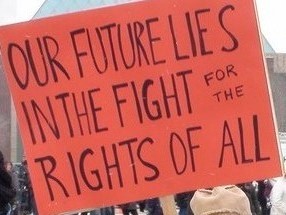 The Legault government did everything it could to present itself as
the champion of the ruling class when the Liberal Party had lost all
credibility in the eyes of Quebec workers because of its anti-social
offensive. The elites needed a new political force to champion the
rich.
The Legault government did everything it could to present itself as
the champion of the ruling class when the Liberal Party had lost all
credibility in the eyes of Quebec workers because of its anti-social
offensive. The elites needed a new political force to champion the
rich.
Workers quickly realized that the CAQ represented the new liberal party with a veneer of nationalism, openly advocating racist positions, and its dictate against the people in the name of so-called "true profound Quebec values." It was obvious from the start that this nationalism was a fraud. It was an illusion to prevent the resolution of the economic crisis through the affirmation of the rights of all, and the constitutional crisis through the adoption of the program of democratic renewal and the affirmation of Quebec's national rights.
The question now, in light of a likely CAQ majority victory on October 3, is how the new government will use its nationalism to block the path for workers to defend their rights. Quebec workers are already familiar with the anti-social notions of successive governments. We need only think of Lucien Bouchard's "social consensus" in the late 1990s or Jean Charest's "reengineering of the state." These political concepts were aimed at preventing organizing for a different direction among the people from emerging. The new nationalism à la François Legault won't work either. Workers will see through it as they have in the past.
But we must be vigilant because the situation in the world is perilous and, as the PMLQ statement says, Quebec is caught up in this maelstrom, this global state of confused movement and violent agitation. We will have to discuss at length in the coming weeks and months, even years, the concrete conditions in which we find ourselves. What to do with the governments of police powers? What to do about the nationalist illusions of the CAQ? What to do with the ridiculous notions that inflation is caused by workers' claims on the value they add to the economy?
Many other questions will arise, but the important thing, as our statement says, is to continue our work to organize discussions that allow workers to make sense of what is happening.
What It Means to Be Civilized in Quebec
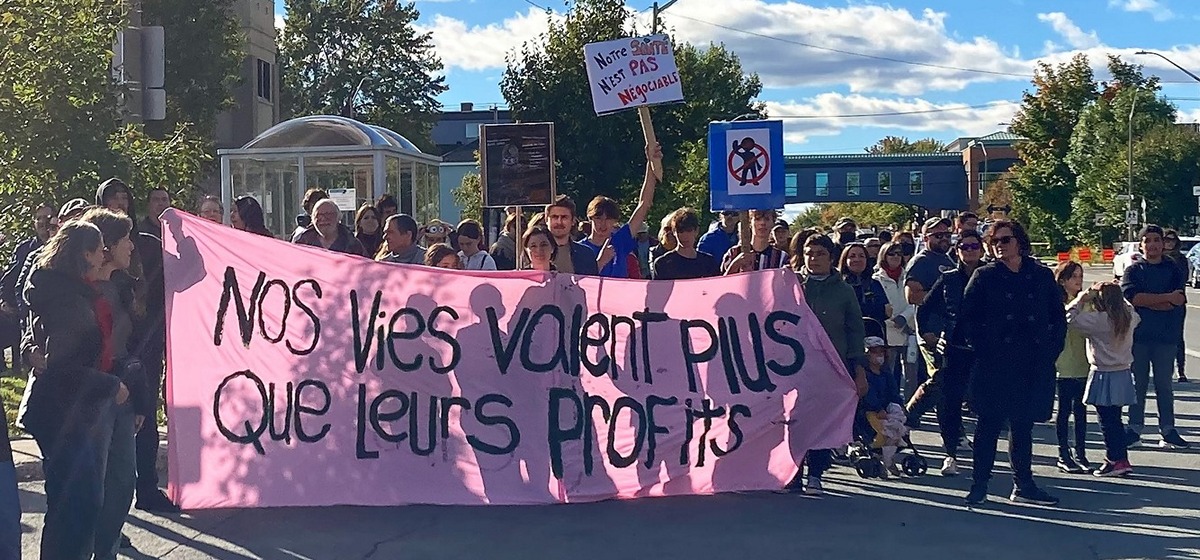
The following remarks were delivered by Richard Desjardins at the mass mobilization on the occasion of the Global Day of Action for Climate Justice in Rouyn-Noranda, September 23, 2022. Title added by TML.
When I was a kid, a few blocks from here from my little room, I could see the chimneys. I thought they made the clouds.
We used to also float rafts on the slag from the mine in the ponds of purple and turquoise water. Psychedelic, wonderful. The word environment did not even exist.
The mine's smog choked us from time to time, but that was the price to be paid, we were told. Even the children paid. And still do, by the way.
The 1960s. René Lévesque, then Minister of Natural Resources, came to Rouyn-Noranda and said, pointing to Noranda and its Copper Kings, "Those guys, we're going to civilize them." It hasn't happened yet.
In the 1970s. I was there in Chile. A leftist had just been elected president of the country, Salvador Allende. He nationalized the country's copper, whose mines were owned by Noranda. In '73, a coup d'état. General Augusto Pinochet seized power with the help of the American Air Force which bombed La Moneda, the presidential headquarters in Santiago. Worldwide astonishment.
The result of Augusto Pinochet's subsequent repression of leftists: 3,000 killed, 40,000 tortured, hundreds of thousands exiled. The first western company to contact the dictator after his coup: Noranda Mines.
Civilized?
The 1980s. The Ministry of the Environment had just been created. It published an ecological study on the Rouyn-Noranda region -- the state of the territory. The problems we face today are described in this report, which seems to have been forgotten for 43 years. Arsenic was not invented yesterday. It has always been part of the copper ore. When it is heated, it volatilizes, even in our lungs.
With the directors Daniel Corvec and Robert Monderie from Rouyn, I worked at that time on the documentary Noranda. I was doing research. I got the idea of going to the Noranda mine's head office in Toronto to see what they thought of us. I was greeted by someone from Public Relations. We were talking about the importance of the company throughout Canada and the world -- 70,000 employees. At one point I brought up the Horne foundry and its problems. I was told: "Yes, it's an old factory but it's versatile. You couldn't imagine it in the suburbs of Toronto, too populated, whereas there we're talking about 30,000 people."
Civilized?
The film revolves around an investigation by researchers from an American industrial medical school, the Mount Sinai School of Medicine in New York, who came here to examine the 500 workers at the foundry, who were on strike at the time. Almost all of them participated. The CSN had organized this impressive clinic when it was also involved in the company.
At first sight, when the director of the medical team saw that the city was practically in the yard of the foundry, he exclaimed: Oh my God! It should have been 15-20 kilometres away.
Five hundred different tests were done on each of the workers. Doctors were coming here to analyze, for the first time, the combined health effects of heavy metals. They couldn't do that in the United States because there the contaminants are everywhere -- a chemical soup -- it's hard to determine where they come from.
But here, the contaminants can only come from one source -- the smelter. The researchers were able to establish that the simultaneous presence of sulphur dioxide -- the smog -- and arsenic could cause lung cancer. They found five on site. The company doctor could have easily detected them.
By cross-checking different studies, the film also showed that the presence of heavy metals (arsenic, lead, cadmium) in the human body increased from Évain [a neighbourhood in Rouyn-Noranda] to the smelter barrier and from the barrier to the reactor. It always increased.
The film also reminded us, by the way, that the government had passed a law in 1926 -- when the smelter first started. Promulgated for the benefit of Noranda, the law said this: "No owner, tenant or occupant of land in the Township of Rouyn can claim damages caused by the noxious gases and fumes produced during the operations of a smelter."
It looks like we're still living under that same law.
The film, once completed, was proposed to the Abitibi International Film Festival, which did not want to include it in its official program because that year, for the first time, it had received a grant from Noranda -- $3,000. Yes, there can be mining interference in festivals.
We rented the Théâtre du Cuivre to show the film. At the doors, security guards from the mine handed out leaflets against the film. Like good anarchists. Just before the screening, the city police arrived in the lobby. They were coming to get one of the film's directors for a parking ticket he had not yet paid.
We asked the police:
- Why now, why here?
- We received a phone call at the station.
- Ah! From whom?
- From the mine.
- Ah.
Still so civilized?
1989. To recover the sulphur from the mud, the company decided to build a sulphuric acid plant on condition that our governments would lend them two-thirds of the cost -- $80 million. We lent it to them. The loan was never repaid.
Civilized?
The 1990s. The wildlife department began warning us every fall not to eat the livers of moose killed within 40 kilometres of the plant because of the cadmium spread on the territory. "And the rest of us, our liver?" we said to ourselves, "What? It's a good thing we're not cannibals. There wouldn't be many people left in town."
Do you know Marc Rich? The man with five different passports, who was convicted of the biggest tax fraud in American history and was facing 325 years in prison? The FBI was on his tail and tried to kidnap him four times. He fled to Switzerland. He's the one who founded Glencore. Died there in 2013.
Do you know Gary Nagle? He was trained by Marc Rich. He is the current boss of Glencore which, by the way, is not a mining company but a brokerage firm in natural resources, wheat, oil, etc. It buys and sells, buys again and sells again.
In recent years the firm has been prosecuted in at least ten countries for fraud and corruption, and regularly pleads guilty. Bandits, and that's not just a figure of speech.
Civilized?
In its budget for this year, Glencore has set aside $1.5 billion for legal fees for its ongoing corruption trials.
All this to say:
Action Boréale is calling for the immediate suspension of operations at the Horne smelter until this killer plant proves that it will operate within the Quebec standard of 3 nanograms of arsenic per cubic metre of air, a standard that is already compromised because arsenic, like lead, does not have an acceptable threshold. Also, during the suspension of operations, Glencore will continue to pay salaries to smelter employees as usual. This shouldn't be too much of a problem for them; the company is worth $101 billion.
Now, do you know the Legault-Fitzgibbon duo, who said they were willing to fund Glencore with public money? Not one cent for them, not one.
Personal opinion: Don't vote for the CAQ, not in Rouyn, not in Val-d'Or, not anywhere. We're going to have problems with this party if it is re-elected.
We will have baskets full
Of black roses to kill the hatred
Territories flowing through our veins
And loves worth having
We'll have everything we lack
Money fires at the bank doors
Slaughterhouses for millionaires
Reservoirs
of light years
And if there's no moon
We'll make one
Thank you.
(Translated from the original French by TML.)
Discussion on How to Get Rid of the Monarchy and Renew
the Constitutional Order
The Queen's Death and Democratic Renewal
It is high time to put an end to the domination of the British monarchy in Quebec and Canada and to establish modern institutions in our service. This is one of the logical conclusions that flows from the death of Queen Elizabeth II and the history that has preceded it since the British conquest.
The institutions in Quebec and all of Canada were established according to 19th century British nation-building, and retained the "royal prerogative." This royal prerogative ensures that privileges are kept in the hands of a tiny minority, which is the essence of absolutism and the archaic notion of the "divine right of kings."
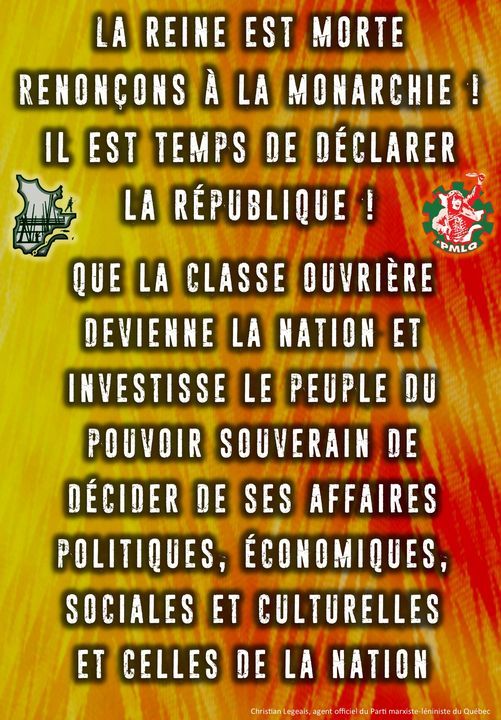 The
maintenance and continuity of this prerogative is of the utmost
importance for the ruling elite. It is not for nothing that the
ceremony swearing in the new King Charles III took place so quickly
after the Queen's death. There was to be no break in the continuity of
the monarchy. For Canada,
the urgency was the same. Prime Minister Trudeau, present at the
ceremony, immediately declared: "On behalf of the Government of Canada,
we affirm our loyalty to the new King of Canada, His Majesty King
Charles III, and offer him our full support."
The
maintenance and continuity of this prerogative is of the utmost
importance for the ruling elite. It is not for nothing that the
ceremony swearing in the new King Charles III took place so quickly
after the Queen's death. There was to be no break in the continuity of
the monarchy. For Canada,
the urgency was the same. Prime Minister Trudeau, present at the
ceremony, immediately declared: "On behalf of the Government of Canada,
we affirm our loyalty to the new King of Canada, His Majesty King
Charles III, and offer him our full support."
When decisions are made from above and the interests of the people are not taken into consideration, nothing good can come of them. Among such decisions are the Treaty of Paris of 1763, when France officially ceded New France to the British; the Quebec Act of 1774; the British Constitutional Act of 1791 which divided the province of Quebec into two political entities, Lower Canada and Upper Canada; the Act of Union of 1840, which abolished those provinces and their legislative assemblies and created a single colony -- the province of Canada (or United Canada) -- under the administration of a governor general, in the wake of the patriots' rebellion of 1837-38 that was crushed by British colonial troops during Queen Victoria's reign; or the naming of Canada the Dominion of Canada and the passing of the British North America Act in 1867. More recent examples include the proclamation of the maple leaf flag of Canada by Queen Elizabeth II in 1965; Canada's patriation of the Constitution of the British Parliament in 1982 which reaffirmed the central role of the Crown in the structure of our government -- the Constitution which Quebec, despite being called a "founding nation," has never signed. All such decisions were made from above and this remains the case today.
A citizen who belongs to the organized body politic has never been the starting point of any such agreement or proclamation, and the recent announcement by the Canadian government concerning King Charles III is the latest example. Proclamations defining executive power for the division of powers have been issued, but there has never been an explicit declaration of democracy.
If we want to talk about democracy, we have to talk about equality. Equality is directly related to structure, namely what structure is needed to ensure equality for all. What are the necessary conditions to have equality? The current structure does not allow for equality. Royal prerogative and divine right block equality. They are impunity, hierarchy, privileges, etc.
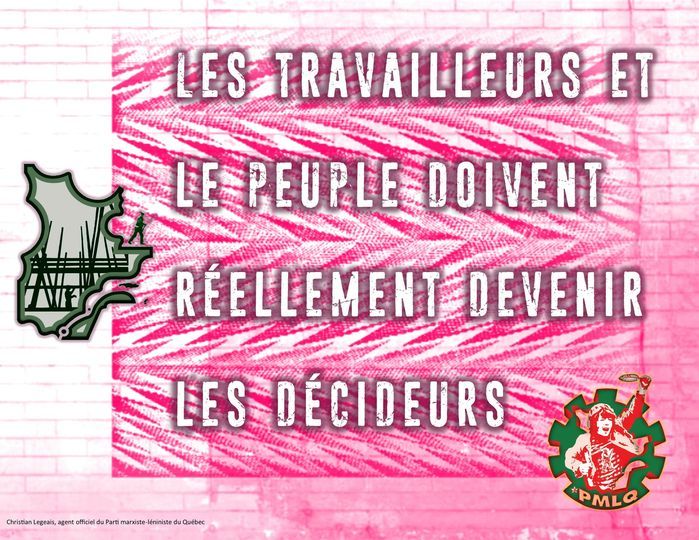 Today,
the cartel parties present the symbols of the monarchy as being
insignificant and that the political system functions despite them. All
this allows the continuation of the system of privileges and blocks the
people from having power in their hands.
Today,
the cartel parties present the symbols of the monarchy as being
insignificant and that the political system functions despite them. All
this allows the continuation of the system of privileges and blocks the
people from having power in their hands.
There are plenty of remnants and footprints of the British Crown in Quebec. These have to be eliminated. Doing so is part of the struggle for democratic renewal, to establish a political process on modern foundations that corresponds to the needs of the day, that is, for the working class to constitute the nation and to vest the people with decision-making power on all matters that affect society. This is the battle being waged today.
The people's allegiance is not to the Crown, but to what the relationship between humans and humans and between humans and nature reveals. It is the historic need for the people to make the decisions. No cartel party has a human-centred nation-building project, whose aim is to defend and ensure the well-being and dignity of all. People must speak for themselves, in their own voice, and not allow others to represent them who in fact are representatives of a so-called divine king.
Christine Dandenault is the PMLQ candidate in Hochelaga-Maisonneuve.
The Right
to Be Who We Are, Not Who
We Are Told to Be
Quebec has a rich and vibrant cultural diversity expressed in multiple social, spiritual and material forms, life-styles, beliefs, values and mores. Out of caring and sharing, working together and historical traditions of the different peoples of Quebec, a web of vast interrelations of the whole people is created.
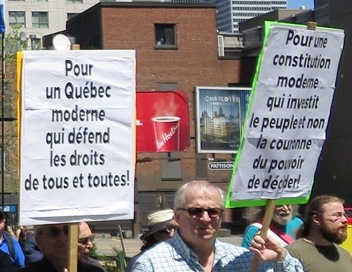
The big parties and the governments they form, attempt to turn the peoples' rich cultural diversity into absolute differences, starting with privileging the myth of two founding nations. The powers-that-be promote an atmosphere of so-called identity politics. Constituencies are formed dividing people by special interests and rivalrous cultural values. Individual is pitted against individual, collective against collective, and cultural community against cultural community. Racism, sexism, assaults on lifestyles and beliefs are promoted, while leaving individuals and communities constantly targeted by the police powers of the government. The narrow privileged and private interests of the few are preserved, while people are disunited, and the norms and rights required by a modern democracy are destroyed.
We must never forget that the most valuable asset we have is us, the Quebec people, and it is high time we united to have a say in the conduct of our own affairs.
I am participating in this election on the basis of the Marxist-Leninist Party of Quebec (PMLQ)'s program for democratic renewal. For this renewal we sorely need sovereignty vested in the people and not in the Crown, the big parties or the rich they represent. I believe democratic renewal and sovereignty are intimately connected to the cultural life of the people.
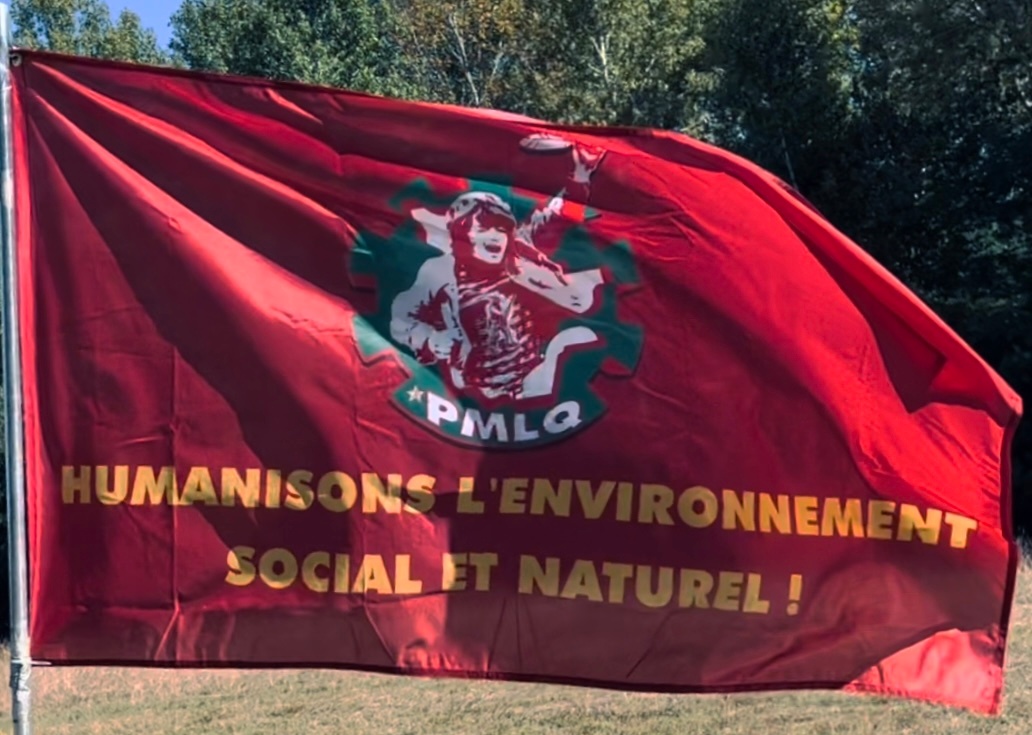 Just
imagine, if Quebec had a real, modern democracy, we would be equal
members of society with a say-so and freedom to speak in our own name.
We would not be burdened by a corrupt, party-dominated political
process which manipulates cultural values to create the impression the
only possibility
is to go with "the devil you know" and against "the devil you don't
know." Any political process that aims to reduce Quebeckers to subjects
voting every few years for candidates they did not choose and who do
not represent their interests, while allowing our culture to come under
assault is not a
modern democracy.
Just
imagine, if Quebec had a real, modern democracy, we would be equal
members of society with a say-so and freedom to speak in our own name.
We would not be burdened by a corrupt, party-dominated political
process which manipulates cultural values to create the impression the
only possibility
is to go with "the devil you know" and against "the devil you don't
know." Any political process that aims to reduce Quebeckers to subjects
voting every few years for candidates they did not choose and who do
not represent their interests, while allowing our culture to come under
assault is not a
modern democracy.
If Quebec had a real, modern democracy we could direct our economy, our resources and our social investments towards the well-being of the people. As a sovereign people we could block the rich and high financiers from plundering our resources and destroying our rich cultural heritage. The problems we face in the natural and social environment would no longer be turned into crises of cataclysmic proportions and ploys to divide us and pay the rich.
Let's come together to find more ways to have this discussion and use this election to block the big parties from grabbing majority positions for their reign of destruction on our people and culture.
Rachel Hoffman is the PMLQ candidate in Notre-Dame-de-Grâce.
Will
Members of Quebec's National Assembly
Swear Allegiance to the King?
A problem which has emerged is that after the current election is over and members of the National Assembly take their seats, they will all be obliged to swear allegiance to King Charles III. For many it is a dreadful thought they find hard to live with. They feel they are compromising their conscience but have no choice. In the absence of a nation-building project which vests sovereignty in the people, many really do not know what to do about this disagreeable situation.
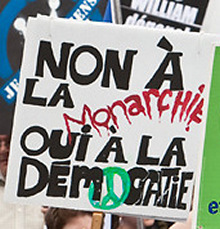 In
1982, the government of René Lévesque passed an act of
the National Assembly which introduced the obligation for all Members
of the National Assembly (MNAs) to swear allegiance to the people of
Quebec. But MNAs must also swear allegiance to the monarch because the
1867 constitution still
requires them to do so.
In
1982, the government of René Lévesque passed an act of
the National Assembly which introduced the obligation for all Members
of the National Assembly (MNAs) to swear allegiance to the people of
Quebec. But MNAs must also swear allegiance to the monarch because the
1867 constitution still
requires them to do so.
That solution merely underscores the kind of irrationality that is introduced when problems are not provided with viable modern solutions. Once allegiance is sworn to the King, which means to Canada's constitutional arrangements which do not recognize Quebec's right to self-determination, then the scope of meaningful action on the part of the National Assembly is automatically diminished and even proscribed.
On several occasions in Quebec's history, elected officials have wanted to refuse to take the oath of allegiance to the Queen, but ended up doing so anyway. One well-known case is that of the six Parti Québécois members who refused to take the oath when they were first elected in 1970. They decided to sit in the spectator gallery for several weeks before finally giving in.
In 2018, the ten elected members of Québec Solidaire made a request to the Secretary General of the National Assembly that they be able to take the oath to the Queen in private so as not to make a show of it and their request was granted. They made the oath to the people of Quebec in public and to the Queen in private. The Parti Québécois members, on the other hand, were given the possibility of changing the oath to say, "Until Quebec is independent... I do solemnly declare that I will be faithful and bear true allegiance to Her Majesty Queen Elizabeth the Second."
Québec Solidaire then tabled a bill to abolish the oath, but the CAQ government voted against it and the bill did not pass. CAQ House Leader Simon Jolin-Barrette tried to justify his party's opposition by saying that "it is not by a motion that this problem can be solved." He said, "It requires a constitutional amendment and that is complex," adding that the issue of the oath of allegiance "is far from the concerns of Quebeckers."
At the time, several constitutional experts argued that there was no need for a law, that MNAs should simply refuse to swear the oath to the monarch. They argued that the National Assembly is de facto sovereign and that, politically, no one among the ruling circles would have the gumption to challenge this when it is known that the vast majority of Quebeckers have nothing but contempt for this obligation to swear an oath to a monarch, and a foreign one at that.
Another argument might be that MNAs have been elected with a majority vote in their constituencies and the National Assembly does not have the right to interfere with the will of the people. That is, either the elected represent the electorate or they represent the monarch. They cannot do both at the same time. It is irrational, ridiculous. Furthermore, according to the latest Pollara survey, only 18 per cent of Quebeckers think Canada should keep its ties to the monarchy; 64 per cent are against.
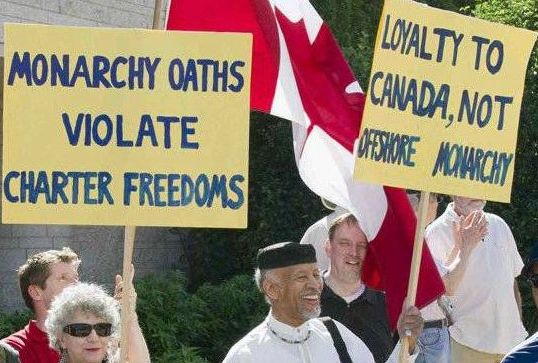 In
the opinion of the Marxist-Leninist Party of Quebec, there should be a
consensus in the National Assembly not to endorse the succession by
refusing to take the oath of allegiance to the King. It is a matter of
principle because it is in contradiction with the idea that
decision-making power is
vested in the National Assembly and that the representatives are
elected by the people. But even if a consensus cannot be reached, the
courage to refuse will reveal who will take up the political fight to
defend their right to take their seats based on receiving the most
votes in their riding during
the election.
In
the opinion of the Marxist-Leninist Party of Quebec, there should be a
consensus in the National Assembly not to endorse the succession by
refusing to take the oath of allegiance to the King. It is a matter of
principle because it is in contradiction with the idea that
decision-making power is
vested in the National Assembly and that the representatives are
elected by the people. But even if a consensus cannot be reached, the
courage to refuse will reveal who will take up the political fight to
defend their right to take their seats based on receiving the most
votes in their riding during
the election.
If elected officials are denied their right to take their place in the National Assembly, how will the vacuum be resolved? Will the King's representative in Quebec dictate the solution, perhaps saying who should sit in his place? Or perhaps there is already a precedent for such a situation? In any case, it looks like a good constitutional crisis that Quebec will be honoured to provoke.
One thing is certain, should everyone refuse to swear this oath of allegiance, it would become de facto the new tradition. Already Quebec refused to affix its signature on the Constitution Act, 1982 because it does not uphold the rights of the Quebec nation to self-determination up to and including the right of secession if it so desires. Refusing the oath would push this further and be another step on the part of the people of Quebec to resolve the Constitutional crisis in their favour and in favour of the peoples of the entire country.
The Significance of Not
Swearing Allegiance
to the King
Since the death of Queen Elizabeth II, there have been many calls in Quebec to end the yoke of the monarchy in Quebec and the current constitutional order. The Marxist-Leninist Party of Quebec (PMLQ) has made its opinion known on this subject and writes: "One thing is certain, if everyone refused to take the oath of allegiance to a foreign monarch, it would become the de facto new tradition. Already, Quebec has refused to sign the Constitution Act, 1982 because it does not respect the rights of the Quebec nation, including the right to self-determination up to and including secession if it so chooses. Refusing the oath would take this further and be one step closer to resolving the constitutional crisis in favour of the people, in Quebec and across Canada."
The PMLQ received emails and comments in support of its proposal. Gestures that change the constitutional status quo offer the people the opportunity to participate in the establishment of their own democratic constitutional order.
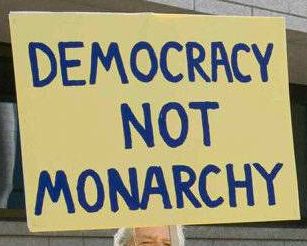 Robert
Dutrisac, in his article "Shake off the monarchical yoke" published in
Le Devoir on September 13, also made his opinion known. He writes,
among other things, that "it cannot be denied that the death of Queen
Elizabeth II and her replacement by King Charles III are changing this
context and
rekindling the debate in Quebec -- and, to a lesser extent, in Canada
-- on the advisability of cutting ties with the British monarchy. It is
a debate that is also taking place in other Commonwealth countries
whose head of state is still that foreign sovereign. This is the case
in tiny countries
like Antigua and Barbuda, but also in New Zealand and Australia. [...]
Robert
Dutrisac, in his article "Shake off the monarchical yoke" published in
Le Devoir on September 13, also made his opinion known. He writes,
among other things, that "it cannot be denied that the death of Queen
Elizabeth II and her replacement by King Charles III are changing this
context and
rekindling the debate in Quebec -- and, to a lesser extent, in Canada
-- on the advisability of cutting ties with the British monarchy. It is
a debate that is also taking place in other Commonwealth countries
whose head of state is still that foreign sovereign. This is the case
in tiny countries
like Antigua and Barbuda, but also in New Zealand and Australia. [...]
"It takes imagination to get rid of an illegitimate constitution and outdated colonial institutions while remaining subject to them. But the project of providing Quebec with a written constitution is not far-fetched. It is a necessary, if incomplete, act of affirmation that our National Assembly, exercising its parliamentary sovereignty, can perfectly well accomplish."
In his article, he shares the opinion of jurist André Binette, professor of law at the University of Sherbrooke, who wrote the book La fin de la monarchie au Québec. Pour une république du Québec dans le cadre canadien (The End of the Monarchy in Quebec. For a Quebec Republic in the Canadian Framework). Dutrisac summarizes Binette's thinking as follows: "The appropriate response to the patriation of the Canadian Constitution, 1982 without the consent of the Quebec nation is the abolition of the monarchy in a Quebec constitution. A majority in the National Assembly representing a majority of voters would be sufficient to adopt this text."
The jurist's proposal, writes Dutrisac, is that "in this constitution, the position of lieutenant governor appointed by Ottawa would be abolished; it would be replaced by a Quebec head of state appointed by two-thirds of the National Assembly or elected by universal suffrage. His or her role would be essentially the same as that of the lieutenant governor, including enacting legislation and dissolving Parliament when necessary. [...]
"Once the Quebec constitution is in place, through which Quebec would exercise its right to internal self-determination, it is expected that the federal government would maintain the office of lieutenant governor. Ottawa would take over from the Quebec government, which would have ceased to pay for the representative of the monarchy. Two possibilities then open up: Quebec would no longer submit laws passed by the National Assembly for the imprimatur of the lieutenant governor, and the new president of the republic would take over this task exclusively, or, for a time at least, the two competing functions would coexist and double up. In the first case, a constitutional crisis is guaranteed, and we'll see where that leads."
On the eve of the October 3 election, the call is for future MNAs not to endorse the succession by refusing to take the oath of allegiance to the king. It would be a gesture of respect to the voters to pledge allegiance to the people of Quebec, a gesture of affirmation of Quebec's right to self-determination and a break with the monarchy. It would shake up the status quo and the old constitutional order.
The Saint-Jean-Baptiste Society for its part has launched a petition for the abolition of the monarchy in Quebec.
(Quotations translated from original French by TML.)
The Discussion Continues
The constitutional order has already been shaken by the numerous discussions in the public sphere questioning the oath of allegiance to the King. In mass work in the riding of Hochelaga-Maisonneuve, it is not uncommon for people to talk about this. Why would we have a foreign monarch in the National Assembly? Why in a modern Quebec? It would be a good thing if a Member of the National Assembly (MNA) refused to pledge allegiance. This puts the battle for Quebec to assert the sovereignty of the people back on the table.
This week, Paul St-Pierre Plamondon, leader of the Parti Québécois, said that if elected he would like to sit as a member of the National Assembly without pledging allegiance to King Charles III. He said: "You cannot, following a democratic and legitimate exercise, force elected officials... to swear an oath to the Crown of a foreign country. I will find a way to make it clear that I do not pledge allegiance to a king, not only of a foreign country, but of British colonialism that has caused real harm to Quebecers [and] Indigenous nations."
He is looking for options, and he put it this way: "I want to talk to the people in charge of protocol and procedure at the National Assembly. I think there is something absolutely unethical and unacceptable about saying that an elected official who is the product of a vote -- so who is democratically elected -- becomes in Quebec automatically constrained to a foreign monarch." The fact is that pledging allegiance to the people of Quebec with one hand and pledging allegiance to the king with the other is nonsensical.
While the polls said he was unlikely to be elected in the Camille-Laurin riding, the situation changed this week. It is said that he has a chance to be elected in Camille-Laurin, after the Québec Solidaire candidate was forced to resign because she removed PQ flyers from a resident's mailbox.
At the constitutional level, according to Patrick Taillon, professor of constitutional law at Laval University, the Canadian Constitution does not provide for any sanctions. However, he said, the Secretary General of the National Assembly, overseeing the signatures of the MNAs who take the oath and making sure that everything has been done according to the rules, could decide to impose a sanction. At the same time, he added that it would be surprising to see the Secretary General prevent an elected official from sitting in the Blue Room because he or she had not sworn to the monarchy. "That would not be in our custom and in the zeitgeist," he added.
Another possibility is that the National Assembly votes in favour of a law to abolish the oath to the British monarchy.
There is no shortage of options when it comes to solving the problem.
Petition for Abolition of Monarchy in Quebec
On September 24, the Saint-Jean-Baptiste Society (SSJB) launched a petition for the abolition of the monarchy in Quebec.
SSJB President Marie-Anne Alepin introduced the petition as follows: "It has been shown repeatedly over the last few decades that Quebeckers are overwhelmingly against the monarchical system. All the results of studies on the question point in this direction: the monarchy is a system that has been imposed on us, in spite of ourselves. Yet, it is presented to us on all platforms as something positive, like a vast personality contest that we should all appreciate. But in reality, what is being proposed to us is nothing better than a reality show, a saga that is costing us immensely on several levels, be it democratic, symbolic or financial. Important political changes all start with a demonstration of strength of popular support. This petition is an opportunity for Quebeckers to mobilize and to state loud and clear our desire for change."
The petition reads as follows:
Abolition of the Monarchy in Quebec
For the Quebec nation, the equal rights of all humans is a fundamental value.
By making us, Quebeckers, the subjects of a king, the monarchical regime denies this equality and imposes archaic and undemocratic symbols on us.
By entrusting the office of head of state and of the armed forces of Canada to a foreign king with "divine" right, the monarchy imposes on the people of Quebec a break with their will to constitute a secular state and to derogate from the principle of equality of all before the law.
Consequently, it consecrates an unbearable intrusion of religion in the affairs of the State.
We, Quebeckers, refuse to be "subjects" of "His Majesty" and to live in a regime where citizens are subject to a monarch of divine right.
We wish to live in a modern and democratic society where all humans are equal in rights.
We, the undersigned, want the monarchy to be officially abolished.
To sign the petition, click here.
(Translated from original French by TML.)
(To access articles individually click on the black headline.)
Website: www.cpcml.ca Email: editor@cpcml.ca


